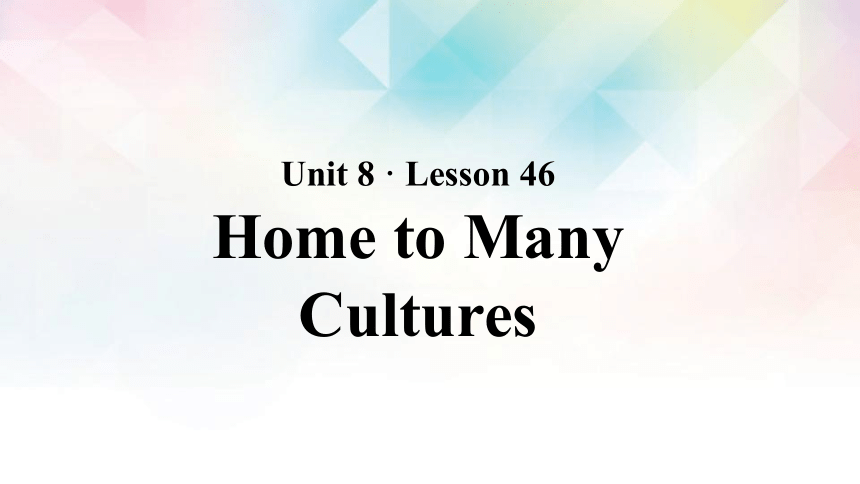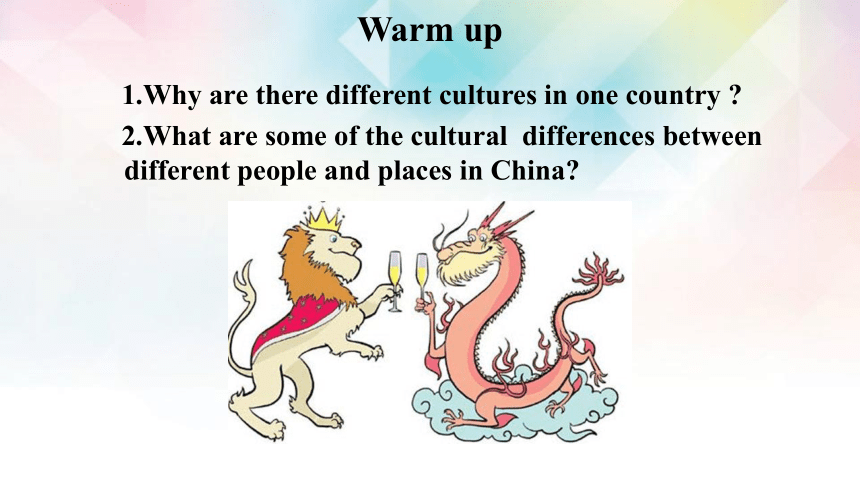Unit 8 Lesson 46 Home to Many Cultures 课件(28张PPT)
文档属性
| 名称 | Unit 8 Lesson 46 Home to Many Cultures 课件(28张PPT) |  | |
| 格式 | pptx | ||
| 文件大小 | 1.7MB | ||
| 资源类型 | 教案 | ||
| 版本资源 | 冀教版 | ||
| 科目 | 英语 | ||
| 更新时间 | 2020-05-11 11:43:45 | ||
图片预览









文档简介
(共28张PPT)
Unit 8 · Lesson 46
Home to Many Cultures
Where is it
Warm up
Capital City: Ottawa
Warm up
National Flag
Warm up
National Bird: Canadian Wild Goose
Warm up
1.Why are there different cultures in one country
2.What are some of the cultural differences between different people and places in China
Warm up
percent
百分之... ...
New words
central
中部的,中间的
New words
immigrant
移民
New words
official
官方的,正式的
New words
custom
习俗,风俗,习惯
New words
Read the lesson and answer the questions.
1. What percent of Canadians are from the First Nations
2. What languages do most immigrants to Canada speak
3. Why are there many cultures in Canada
4. What’s the Canadian way of understanding the world
1.3%.
The language of their first country and English or French.
Because many immigrants from every part of the world come to Canada.
It’s that people should respect and accept one another and help one another.
Presentation
Fill in the blanks with the correct forms of the given words.
1. He came back from ________ (Canada) three years ago, but he keeps in touch with his __________ (Canada) friends.
2. If you could travel to only one __________ (Europe) country, which one would you choose
3. He wonders what this means for the future of ______ (Asia) markets.
4. Understanding cultural ___________ (difference) is very important for companies involved in international business.
5. I’d like to take you to our city’s ______ (centre) park.
Canada
Canadian
European
Asian
differences
central
Presentation
1.Three percent of all Canadians are First Nations people.
percent 是“百分之……”的意思。在英语中,百分数用“基数词+percent”表示。
基数词+percent of+名词 代词用作主语时,谓语动词与介词 后面的名词或代词一致。
2.Now more than half of ……
more than 多于;超过其后跟数词,相当于over。
more than 还意为“不仅仅;不止”。
3.The rest are from…
the rest 多余的;剩余的
Language points
the rest of 其余的;剩余的
后接名词或代词。the rest of 结构作主语时,谓语动词的单复数取决于of 后面接的名词的单复数形式。
4.according to 根据
它为复合介词,后接名词或代词。
5.the number of …意为“……的数量”,后接可数名词复数,作主语时谓语动词用单数。
拓展:a number of 表示“许多;大量”,后接可数名词复数,作主语时谓语动词复数。
6.from…to…为常用介词短语,意为“从……到……”
Language points
7. it在句中作形式主语,实际主语是that引导的从句。 important, impossible, necessary, proper等形容词后的that从句,无论主语是第几人称,谓语都可以用动词原形。
e.g. It is necessary that you study hard.
你努力学习是必要的。
It is impossible that all the things be finished in one day.
一天内完成所有的事情是不可能的。
Language points
receive和accept
从含义上说,receive表示“收到”这一客观事实;而accept则表示主观上“接受”。
e.g. I received a present from Jeff, but I’m not going to accept it.
我从杰夫那儿收到了一份礼物,但我不打算接受它。
Language points
表示“收到”时,receive是一个较为正式的词,尤用于英语书面语。在日常英语中人们一般用get。
e.g. What did you get for your birthday
你收到了什么生日礼物?
从搭配上说,在表示“接受教育(education)、受到欢迎(welcome)、得到支持(support)、接待客人(guest)”等时,通常用receive,而accept无此用法。
e.g. Project Hope has helped lots of poor children receive good education.
希望工程帮助很多贫困孩子授受了好的教育。
Language points
one anther的意思是“互相”,与each other同义。
e.g. The teachers in our class learn
from one another.
我们班的老师互相学习。
Language points
Make sentences using the given information.
1. the number of websites / 22 in 2009/ 315 in 2013, the report (rise from … to, according to)
→The number of websites rose from 22 in 2009 to 315 in 2013, according to the report.
Practice
2. the price of it / $25 a kilogram in 2003 / $250 this year / the research (rise form … to, according to)
→______________________________________________
______________________________________________
The price of it rose from $25 a kilogram in 2003 to $250 this year according to the research.
3. David’s weight / 150 pounds last month / 120 pounds this month / his doctor (drop from… to, according to)
→_______________________________________________
_______________________________________________
David’s weight dropped from 150 pounds last month to 120 pounds this month according to his doctor.
Practice
Describe the custom of Canada in the groups.
Practice
Describe the custom of China in the groups.
Practice
Work in groups:
List some traditional Chinese customs.
Try to find the similarities and differences between Chinese and other cultures.
Practice
Write down the similarities and differences between Chinese and other cultures.
Writing
Enjoy the story: How to do that solve the trouble
Practice makes perfect.
Extension
1.Listen and read.
2.Finish exercises of this lesson.
Homework
再 见
Unit 8 · Lesson 46
Home to Many Cultures
Where is it
Warm up
Capital City: Ottawa
Warm up
National Flag
Warm up
National Bird: Canadian Wild Goose
Warm up
1.Why are there different cultures in one country
2.What are some of the cultural differences between different people and places in China
Warm up
percent
百分之... ...
New words
central
中部的,中间的
New words
immigrant
移民
New words
official
官方的,正式的
New words
custom
习俗,风俗,习惯
New words
Read the lesson and answer the questions.
1. What percent of Canadians are from the First Nations
2. What languages do most immigrants to Canada speak
3. Why are there many cultures in Canada
4. What’s the Canadian way of understanding the world
1.3%.
The language of their first country and English or French.
Because many immigrants from every part of the world come to Canada.
It’s that people should respect and accept one another and help one another.
Presentation
Fill in the blanks with the correct forms of the given words.
1. He came back from ________ (Canada) three years ago, but he keeps in touch with his __________ (Canada) friends.
2. If you could travel to only one __________ (Europe) country, which one would you choose
3. He wonders what this means for the future of ______ (Asia) markets.
4. Understanding cultural ___________ (difference) is very important for companies involved in international business.
5. I’d like to take you to our city’s ______ (centre) park.
Canada
Canadian
European
Asian
differences
central
Presentation
1.Three percent of all Canadians are First Nations people.
percent 是“百分之……”的意思。在英语中,百分数用“基数词+percent”表示。
基数词+percent of+名词 代词用作主语时,谓语动词与介词 后面的名词或代词一致。
2.Now more than half of ……
more than 多于;超过其后跟数词,相当于over。
more than 还意为“不仅仅;不止”。
3.The rest are from…
the rest 多余的;剩余的
Language points
the rest of 其余的;剩余的
后接名词或代词。the rest of 结构作主语时,谓语动词的单复数取决于of 后面接的名词的单复数形式。
4.according to 根据
它为复合介词,后接名词或代词。
5.the number of …意为“……的数量”,后接可数名词复数,作主语时谓语动词用单数。
拓展:a number of 表示“许多;大量”,后接可数名词复数,作主语时谓语动词复数。
6.from…to…为常用介词短语,意为“从……到……”
Language points
7. it在句中作形式主语,实际主语是that引导的从句。 important, impossible, necessary, proper等形容词后的that从句,无论主语是第几人称,谓语都可以用动词原形。
e.g. It is necessary that you study hard.
你努力学习是必要的。
It is impossible that all the things be finished in one day.
一天内完成所有的事情是不可能的。
Language points
receive和accept
从含义上说,receive表示“收到”这一客观事实;而accept则表示主观上“接受”。
e.g. I received a present from Jeff, but I’m not going to accept it.
我从杰夫那儿收到了一份礼物,但我不打算接受它。
Language points
表示“收到”时,receive是一个较为正式的词,尤用于英语书面语。在日常英语中人们一般用get。
e.g. What did you get for your birthday
你收到了什么生日礼物?
从搭配上说,在表示“接受教育(education)、受到欢迎(welcome)、得到支持(support)、接待客人(guest)”等时,通常用receive,而accept无此用法。
e.g. Project Hope has helped lots of poor children receive good education.
希望工程帮助很多贫困孩子授受了好的教育。
Language points
one anther的意思是“互相”,与each other同义。
e.g. The teachers in our class learn
from one another.
我们班的老师互相学习。
Language points
Make sentences using the given information.
1. the number of websites / 22 in 2009/ 315 in 2013, the report (rise from … to, according to)
→The number of websites rose from 22 in 2009 to 315 in 2013, according to the report.
Practice
2. the price of it / $25 a kilogram in 2003 / $250 this year / the research (rise form … to, according to)
→______________________________________________
______________________________________________
The price of it rose from $25 a kilogram in 2003 to $250 this year according to the research.
3. David’s weight / 150 pounds last month / 120 pounds this month / his doctor (drop from… to, according to)
→_______________________________________________
_______________________________________________
David’s weight dropped from 150 pounds last month to 120 pounds this month according to his doctor.
Practice
Describe the custom of Canada in the groups.
Practice
Describe the custom of China in the groups.
Practice
Work in groups:
List some traditional Chinese customs.
Try to find the similarities and differences between Chinese and other cultures.
Practice
Write down the similarities and differences between Chinese and other cultures.
Writing
Enjoy the story: How to do that solve the trouble
Practice makes perfect.
Extension
1.Listen and read.
2.Finish exercises of this lesson.
Homework
再 见
同课章节目录
- Unit 7 Work for Peace
- Lesson 37 Don't Fight!
- Lesson 38 Making School a Better Place
- Lesson 39 The Dove and the Olive Branch
- Lesson 40 The UN—Power of Words
- Lesson 41 Jenny's Good Advice
- Lesson 42 Peace at Last
- Unit Review
- Unit 8 Culture Shapes Us
- Lesson 43 A Visit to Chinatown
- Lesson 44 Popular Sayings
- Lesson 45 Different Manners
- Lesson 46 Home to Many Cultures
- Lesson 47 Good Manners
- Lesson 48 Supper with the Bradshaws
- Unit Review
- Unit 9 Communication
- Lesson 49 Get Along with Others
- Lesson 50 Tips for Good Communication
- Lesson 51 What Could Be Wrong?
- Lesson 52 The Power of a Smile
- Lesson 53 Working in Groups
- Lesson 54 How Embarrassing!
- Unit Review
- Unit 10 Get Ready for the Future
- Lesson 55 Look into the Future
- Lesson 56 Manage Your Time
- Lesson 57 Best Wishes
- Lesson 58 Ms.Liu's Speech
- Lesson 59 Keep Your Choices Open
- Lesson 60 Get a Good Education
- Unit Review
